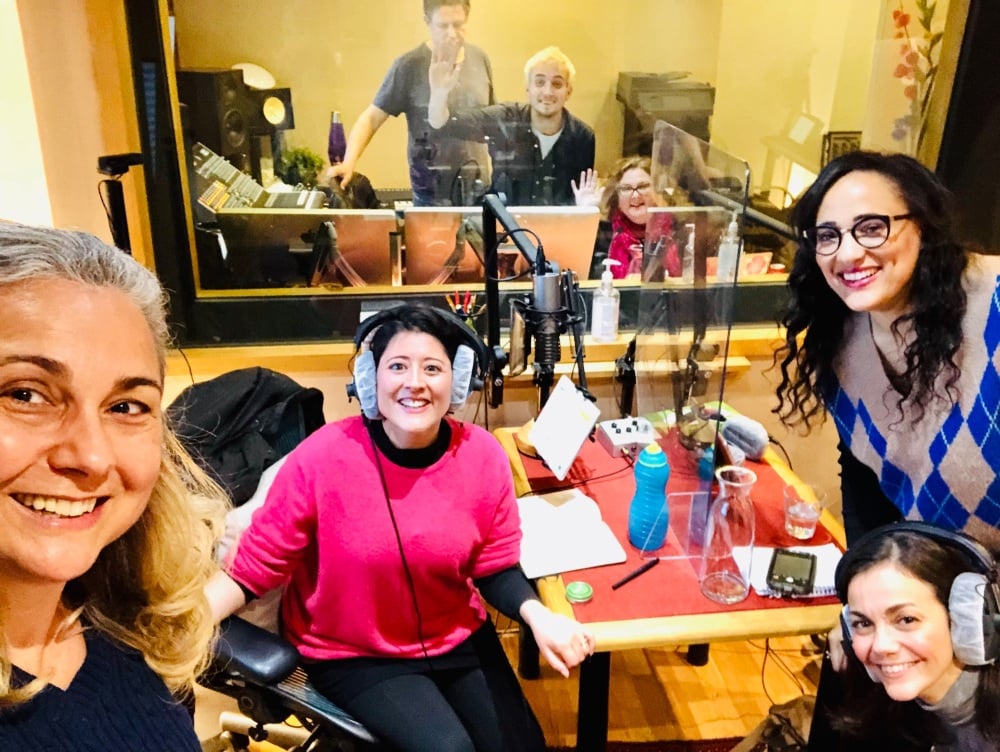Cultural Context in Voiceovers
Posted on
Hello fellow voicers,
This week I ended up, as often happens, having a chat with a client that was significantly longer than the voice session itself. I have to say that I really love that part of the job. I love voicing because for those delicious *checks logs - 10 minutes the client and their client are listening to me and my voice only. They are listening with such great attention that I do feel that I am broadcasting to the whole world. And come on, how great is that?!
But then, the bit that always totally makes me purr with pure joy is that bit where I get to chat to the client. In this case, their client had signed off and we stayed online having a jolly good chat. This particular job got us both thinking. Everyone always assumes that being a good voice is just that “BEING A GOOD VOICE” but what my client and I realised is that actually the voice is there to be more than a voice. Yes, there is a lot of character work, ability to improvise, ability to take direction, ability to inhibit different characters and if you are recording from your own studio you are directing, editing, sound engineering, voicing and being an actual person as well. Phew, its making me hungry just thinking about that and I do this on a daily basis.
Voices bring more than voice to the table
But there is something else that the voice brings with them. A wealth of cultural character contextual experience. What’s that then chica? I hear you cry. Well, let me tell you. I work a lot these days as a bilingual and third language voice over. I often voice in my Chilean Spanish accent for clients that want an authentic LATAM accented voice. Yes, I was born in the UK but I am made by my cultural experiences and of those there are many. And because of that my role as a voice becomes bigger than voice, I become an advocate for cultural context. My wonderful client and I chatted so long about this that she recommended I write about this rather niche but very important VoiceOver activity. Thanks Ellie!

We live in a world that many large companies are journeying towards a more diverse and multicultural setting for many of their internal and external operational and marketing components. So we see training programmes to on board and educate staff, adverts and copy aimed at building a connection with people. This copy will often be translated into many languages - big tick! This acknowledgement that staff and clients are all different and diverse is excellent. However and this is where the experience of a multi cultural and bilingual voice comes in, let’s zoom into that cultural context.
Cultural Context in voiceovers
I read a lot of scripts written in one language and translated into another. So far so good. Or is it? Actually I would say 99% of the time only a translation has been achieved. But what about context? There seems to rarely be an acknowledgement of actual context for copy or character. I recently had to play “Carolina” (names have been changed to protect the client) and I spoke her words. The end client came and re-directed me and gave me notes to deliver the lines differently. I spoke those lines how they wanted and they loved it. But to me, it felt off. Why? Because the deliver of the copy was for another culture. Specifically American. I didn’t feel it was what my character being hispanic would have done. It would not have been in their emotional or professional wheel house. Now of course “Carolina” may have delivered her lines in an American character way but given that she was still heavily hispanically accented then I doubt she would have grown up in home, school, college environment that would have meant her delivery would have been as the client had directed.
Another example - I played an American this time for a very big financial company. The copy was written in UK English and I also did the UK accent for it. So when they said “ohhh can you do American” I swiftly delivered my lines. However two words stood out for me and they were “Of course” In all my years working with Americans and the American market and all the training on my American accent I have rarely heard any of them say “Of course” I am willing to be proven wrong on this but what felt and sounded much better was “for sure” The British copy and person would of course have said of course. But in the American accent, the American character it felt odd. I piped up that “For Sure” would be more appropriate for the context. Everyone directing was British so to be honest we really didn’t know. So I ended up recording two versions and yep you’ve guessed it - the American market went with the version with “For sure”.
“How are you? I’m fine, how are you?” Likely that you are a brit reading this and you will recognise this saying. Every conversation pretty much starts like this. This example comes from a German friend who was horrified when she starting working in the UK that she was asked this when she had to phone a supplier. “But this question’ she said her face still a horrified mask on it “it is so personal” I pondered a bit because I raised as a good little Brit saw nothing wrong at all with the question. And then it clicked. My friend had not realised that far from being a personal question it was simply a way of greeting someone. In the UK we would normally get past those social niceties and then get to it. But in Germany I am told that no one goes around asking people how you are because it is very personal and no thank you very much am not telling you about my in grown toenail. This does explain why perhaps whenever I was in Germany before this chat with my mate, people would look at me oddly when I would ask them how they were!
And one final example. This one I am reliably informed by from some Italian mates who regularly stop and look bemused whenever they come across it. We at Brits hear it quite a lot, summer comes and suddenly advertisers talk about strawberries and cream, gin and tonic and picnics and dining “al fresco”. It’s been used so much that I hear people in town talking about going out “al fresco” and “ohhh time for some drinkies al fresco.” Now while the phrase does kinda mean certain things - fresco for example is fresh or can be cool as in fridge cool. But the phrase “alfresco” means to an Italian “in prison.” Ohhhhhh whoops. Now you will think about dining al fresco in a very different way.

So a voice does much more than bring words to life, they bring cultural context to life. Language and culture is as complex as characters and I would say to all clients, recognise such complexities and cultural norms and go from translating to localisaing with real attention to cultural context. That is what my fab client is aware of and what I as a VoiceOver always look out for. Context is always queen!
Keep talking,
xx